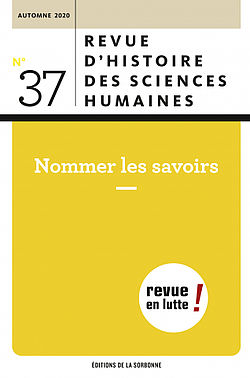Léa Renard | Associated Researcher

Home Institution
:
Universität Heidelberg
|
Disciplines
:
Sociology
|
Biography
- Seit Januar 2023: Wissenschaftliche Mitarbeiterin (Post-Doc) am Max-Weber-Institut für Soziologie der Universität Heidelberg (Lehrstuhl Empirische Makrosoziologie, Prof. Dr. Matthias Koenig)
- 2020-2022: Wissenschaftliche Mitarbeiterin im DFG-Projekt "Der globale Wandel der Kategorie ‚Zwangsarbeit‘", Lateinamerika-Institut, Freie Universität Berlin
- Juni 2018-Dezember 2019: Forschungsassistentin am Wissenschaftskolleg zu Berlin
- Oktober 2013-April 2019: Bi-nationales Promotionsprojekt (Cotutelle-de-thèse) an der Universität Potsdam und der Universität Grenoble Alpes (Frankreich)
Dissertation: „Socio-histoire de l'observation statistique de l'altérité : Principes de classification coloniale, nationale et migratoire en France et en Allemagne (1880-2010)“ (summa cum laude) - Juni 2013: MA-Abschluss in Politikwissenschaft, Institut d'Etudes Politiques de Grenoble
Schwerpunkt: „Sciences de gouvernement (Regierungswissenschaften) im Vergleich“
Masterarbeit: „Gouverner la population nationale par les chiffres: Socio-histoire de la statistique des migrations en France et en Allemagne au XIXe siècle (1860-1899)“ - WS 2011-2012: ERASMUS Semester an der Universität Innsbruck, Österreich
- Juni 2011: BA-Abschluss in Soziologie, Universität Pierre Mendès France, Grenoble II
- Juli 2011: BA-Abschluss in Politikwissenschaft, Institut d'Etudes Politiques de Grenoble
Schwerpunkt: Politik
Scholarship
- 1.10.-30.11.2017: Centre Marc Bloch, Abschlussstipendium
- 01.03.-31.08.2015: ExploRA Doc (Région Rhone-Alpes), Mobilitätsstipendium
- 1.04.-30.06.2014: CIERA, Mobilitätsstipendium
Title of thesis
A socio-histoire of the statistical construction of otherness: Colonial, national and migratory classification principles in France and Germany (1880-2010)Summary of thesis
Around 1990 in France and 2005 in Germany, two new categories were introduced in the field of population statistics. Both “immigré” and “Person mit Migrationshintergrund” use the semantics of migration to describe a population group. My analysis shows that these two events reveal a shift in the meaning associated to migration in statistical categories in both countries. The meaning of the category changes from a mere description of mobility to the ascription of otherness within a population, a change linked to the so-called integration policy that is developing in France and Germany in the years 1990-2000. The analysis reveals the way in which statistics make migration socially relevant to the construction of otherness. The thesis thus develops a renewed approach to the interactions between statistical observation and public policy, by empirically testing the hypothesis of the “circularity of knowledge and action” developed by Alain Desrosières. These shifts in statistical nomenclatures can only be understood if we adopt a long-term perspective. It is necessary to look at the history of statistics and to compare how populations have been classified differently over time in order to understand the new categories invented at the turn of the 20th and 21st centuries. We therefore question the genesis and institutionalization of the categories of otherness and mobility in the period 1880-1914, during the formation of France and the German Kaiserreich as nation states and colonial empires. To observe these processes empirically, we chose to compare the practices of categorization of otherness and mobility (1) in France and Germany, (2) at two different time periods, 1880-1914 and 1990-2010, and (3) in the metropolitan as well as colonial context. The analytical foci in both periods are slightly different. For 1990-2010, the aim was to reconstruct the genesis of the categories “immigré” and “Person mit Migrationshintergrund”, whereas the analysis of the period 1880-1914 consists of uncovering historical ruptures and continuities in the classification principles over the entire period. The approach is neither symmetrical, nor chronological: it contrasts two historical configurations in an attempt to identify similarities and differences. Our results show that between 1880 and 1914, migration as a category was mostly associated with a mobility phenomenon in political and statistical discourse. At that time, the focus was on emigration, redefined as a geographical outward movement, i.e. people leaving the borders of the nation and the Empire. The transport of “emigrants”, a category of population that fueled public debate and statistical tables, was constructed as a political problem. Statistics on emigration were then separated from the observation of the composition of the population. In the metropolitan context, this happened through the introduction of the criterion of nationality and in the colonial context through “racial” patterns. In 1990 in France and 2005 in Germany, migration semantics were then used to statistically observe the composition of the population. Our results reveal three principles along which the construction of otherness takes place in the two countries and in the two time periods studied: a national principle, a colonial principle and a migratory principle. These findings remind us that statistics are never neutral but always steeped in their socio historical and political context – an important aspect to remember especially in times when migration policies are again a topic high on the agenda of public debates and policy makers.
Supervisor
Projects
- 2011-2016: ANR-DFG Projekt „Die Metamorphosen der Gleichheit II: Deutungsmodelle des Geschlechts am Beispiel berufsstatistischer Klassifikation, Verhandlungen und Gleichstellungspolitiken im deutsch-französischen Kontext (1945-2010)“
Kooperationspartner: Lehrstuhl für Soziologie der Geschlechterverhältnisse, Universität Potsdam und Laboratoire LISE-CNAM-CNRS, Paris
Forced labour as a shifting global category: classification, comparison and meanings of work in the International Labour Organization (ILO), 1919 – 2017
37 | 2020 Revue d'histoire des sciences humaines. "Nommer les savoirs"
September 30, 2020Guillaume Mouralis , Martin Herrnstadt , Léa Renard , Serge Reubi , Nikola Tietze
Revue d'histoire des sciences humaines
Edition: Éditions de la Sorbonne
Collection: Revue d'histoire des sciences humaines
ISBN: 979-10-351-0593-8
Les noms des savoirs sont souvent des boîtes noires que l’on manipule avec ingénuité. Pourtant, qu’ils forgent de nouveaux intitulés pour leurs pratiques savantes ou reprennent des dénominations existantes, les savants eux-mêmes y prêtent une grande attention. Étudier la façon dont on nomme et regroupe les savoirs permet de travailler sur leur émergence, les conditions de leur succès, leurs resémantisations invisibles ou les controverses qui les ont traversés. La dénomination et l’agrégation des savoirs sont indissociables de partitions, de découpages et de distinctions. À travers l’analyse des différentes épithètes feuilletant la « géographie » dans la France des xixe-xxe siècles, on met par exemple au jour une histoire beaucoup moins unitaire que ne le voudraient les représentations autochtones. Souvent transnationaux, les cas étudiés témoignent des appropriations variées d’un même terme comme « enquête », « ethnopsychiatrie » ou le diptyque philologie/linguistique. Enfin, en s’arrêtant sur « behavioral sciences », « moral sciences », « Geisteswissenschaften » ou « sciences humaines » c’est l’objet même de la Revue d’histoire des sciences humaines qui se trouve interrogé.
